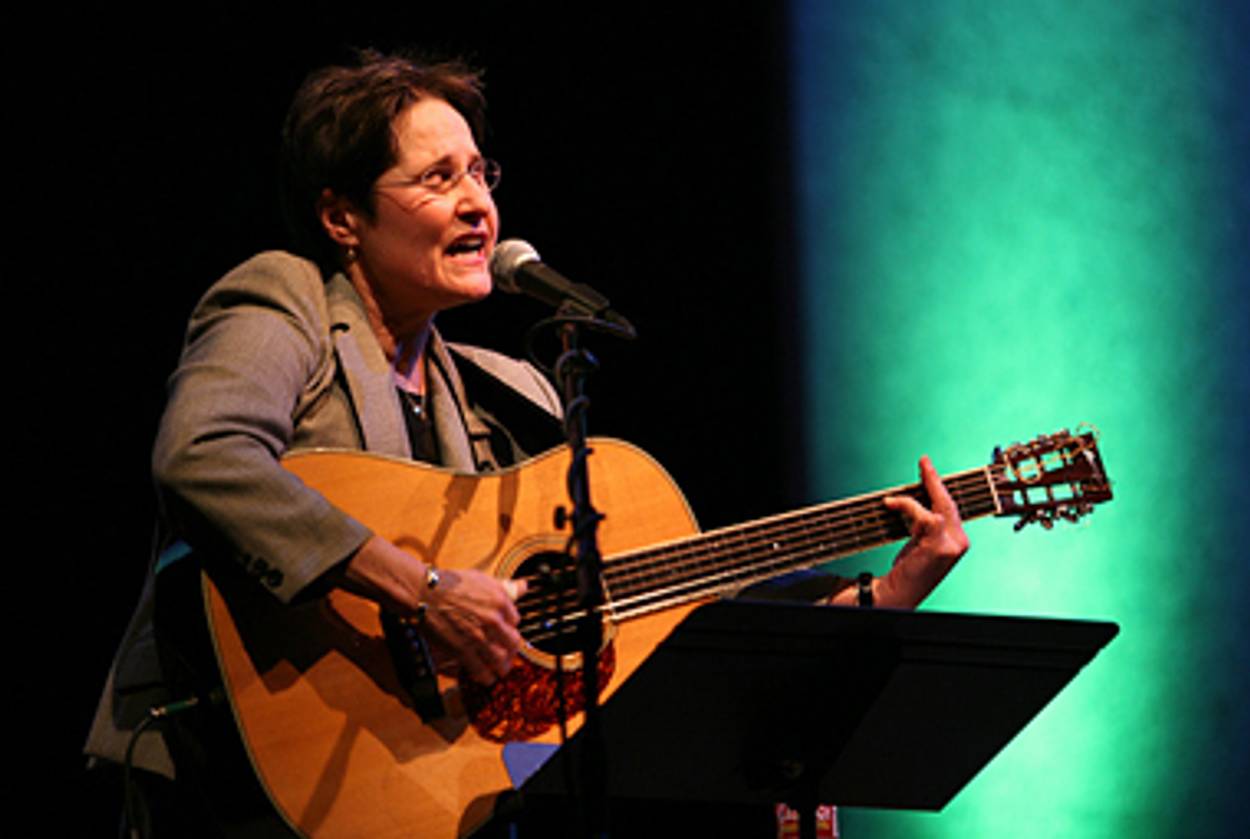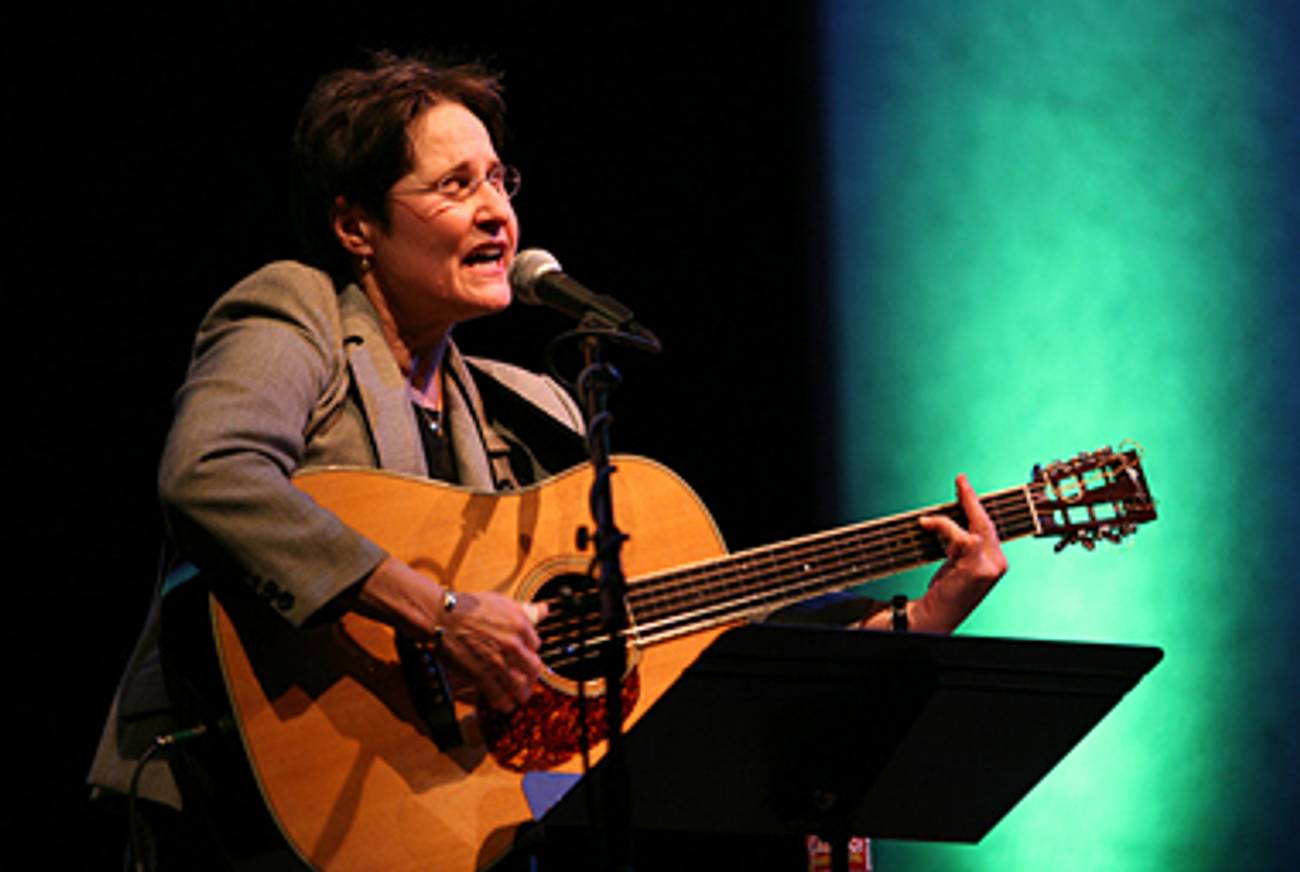Song and Prayer
The musician Debbie Friedman, who died Sunday, helped inaugurate liberal Judaism’s sing-along style of worship and awaken her listeners to an inclusive, progressive, and accessible strain of spirituality




Just after the Union for Reform Judaism confirmed last Sunday that singer-songwriter Debbie Friedman had died at age 59 of pneumonia in a hospital in Orange County, California, an outpouring of grief lit up Jewish websites and blogs and filled messages on social media sites, expressing gratitude toward a woman whom many said had changed their lives, bringing them a new sense of Jewish spirituality.
Most of these people had never met Debbie Friedman. Many had never even seen her perform live. They had only heard her music on recordings or sung her compositions in synagogue. Yet they grieved as if they had lost a close friend.
More than perhaps any other Jewish musician of the past 40 years, Friedman reached listeners in an extremely personal and intimate way. She helped pioneer the participatory, sing-along style of musical worship that now characterizes liberal congregations across North America. She also awakened listeners to a particular strain of Jewish spirituality—inclusive, progressive, and above all accessible—that they had either sought in vain, or could not articulate clearly enough to pursue alone.
In the late 1960s, when Friedman first began writing and performing, musical change had begun to infiltrate the nation’s synagogues. A new generation of rabbis, eager to reach young congregants who were alienated by traditional Hebrew prayer and nusach, or liturgical music, began commissioning services that borrowed from folk, rock, and jazz. At the same time, the rapidly expanding Reform summer-camp movement offered a forum for young Jewish musicians with a taste for socially conscious folksong to experiment with material that owed more to Joan Baez and Bob Dylan than it did to traditional hazzanut, or cantorial performance.
Born in 1951 in Utica, New York, and raised in St. Paul, Minnesota, Friedman’s own tastes ran to Judy Collins and Peter, Paul, and Mary. From an early age, she said she yearned for a more vibrant alternative to what she once described to the New York Times as the “dull and passive” services of the Reform and Conservative synagogues her family attended.
She picked up the guitar while working at a Zionist summer camp in Wisconsin, and she soon began writing and sharing her own music at Reform synagogues and camps. Her peers and partners included Michael Isaacson, who helped invent the Jewish camp song and folk service at Camp Kutz before embarking on a distinguished career as a composer of both liturgical and commercial music, and Jeff Klepper, who studied songwriting with Friedman at Kutz in 1969 and who, along with Dan Freelander, founded the popular folk duo Kol B’Seder.
By the early 1970s, these and other participants in the burgeoning American nusach movement were exerting an influence well beyond summer-camp circles. Their use of mixed Hebrew and English lyrics, pseudo-folk melodies, and simple guitar accompaniment, along with their emphasis on participatory unison singing, began to filter into Reform synagogues, gradually displacing the more formal format of a cantor accompanied by a choir and organ that had previously been favored.
But like her predecessor and Hasidic analog, Shlomo Carlebach, Friedman possessed a personal warmth and charisma that set her apart and earned her a particularly devoted following. She also continued to break new ground throughout her career. A lifelong feminist who aspired to the goal of kol isha for col isha, the voice of woman for every woman, she was an early proponent of using gender-neutral language, and her own experience with recurring, and often debilitating, illness from the late 1980s onwards led her to pioneer the music-driven healing services that have become a staple in many communities. Her setting of the “Mi Shebarach” has been adopted as a communal prayer for healing by congregations across the country, just as her havdala melody is now the standard in most Reform synagogues (even though many who sing it don’t know its provenance).
Still, Friedman’s legacy is not entirely unmixed. Even as illustrious a collaborator as Isaacson now laments the extent to which the simple folk style that he and Friedman helped popularize has elbowed more traditional, and often classically influenced, liturgical music off the stage, leaving many younger congregants ignorant of their larger musical heritage. (Ironically, in 2007, Friedman—who had neither cantorial training nor a college degree—was appointed to the faculty of the School of Sacred Music at Hebrew Union College-Jewish Institute of Religion, where she taught both rabbinical and cantorial students.) And there are those who remain skeptical of the New Agey, “kumbaya” quality that adheres to so many of the guitar-wielding song-leaders who have followed in her footsteps.
Yet Friedman herself never inspired anything but gratitude and devotion among those who knew her or her music. Indeed, she seems to have lived the lyrics to one of her most popular songs, “Lechi lach,” a song that now seems a fitting tribute to a woman who was both a guide and a blessing to the many people whose lives she touched.
Lechi lach to a land that I will show you
Lech l’cha to a place you do not know
Lechi lach on your journey I will bless you
And you shall be a blessing, you shall be a blessing
You shall be a blessing lechi lach
Lechi lach and I shall make your name great
Lech l’cha and all shall praise your name
Lechi lach to the place that I will show you
Li-simchat chayim, li-simchat chayim
Li-simchat chayim lechi lach.
And you shall be a blessing, you shall be a blessing
You shall be a blessing lechi lach.
Alexander Gelfand is a recovering ethnomusicologist, a sometime jazz pianist, and a former West African drummer. His work has appeared in the New York Times, the Chicago Tribune, the Forward, and elsewhere.
Alexander Gelfand is a recovering ethnomusicologist, a sometime jazz pianist, and a former West African drummer. His work has appeared in the New York Times, the Chicago Tribune, the Forward, and elsewhere.